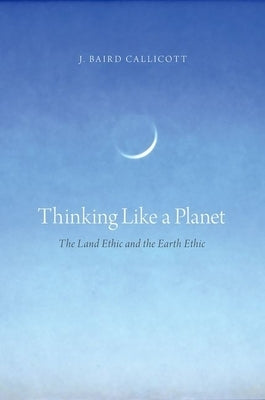1
/
of
1
Oxford University Press, USA
Thinking Like a Planet: The Land Ethic and the Earth Ethic
Thinking Like a Planet: The Land Ethic and the Earth Ethic
Regular price
$112.92 USD
Regular price
Sale price
$112.92 USD
Shipping calculated at checkout.
Quantity
Couldn't load pickup availability
Bringing together ecology, evolutionary moral psychology, and environmental ethics, J. Baird Callicott counters the narrative of blame and despair that prevails in contemporary discussions of climate ethics and offers a fresh, more optimistic approach. Whereas other environmental ethicists limit themselves to what Callicott calls Rational Individualism in discussing the problem of climate change only to conclude that, essentially, there is little hope that anything will be done in the face of its "perfect moral storm" (in Stephen Gardiner's words), Callicott refuses to accept this view. Instead, he encourages us to look to the Earth itself, and consider the crisis on grander spatial and temporal scales, as we have failed to in the past. Callicott supports this theory by exploring and enhancing Aldo Leopold's faint sketch of an Earth ethic in "Some Fundamentals of Conservation in the Southwest," a seldom-studied text from the early days of environmental ethics that was written in 1923 but not published until 1979 after the environmental movement gathered strength.
Author: J. Baird Callicott
Publisher: Oxford University Press, USA
Published: 02/04/2014
Pages: 374
Binding Type: Paperback
Weight: 1.15lbs
Size: 9.10h x 6.10w x 1.20d
ISBN: 9780199324897
Review Citation(s):
Choice 10/01/2014 pg. 289
Author: J. Baird Callicott
Publisher: Oxford University Press, USA
Published: 02/04/2014
Pages: 374
Binding Type: Paperback
Weight: 1.15lbs
Size: 9.10h x 6.10w x 1.20d
ISBN: 9780199324897
Review Citation(s):
Choice 10/01/2014 pg. 289
About the Author
J. Baird Callicott is University Distinguished Research Professor at the University of North Texas. He is co-Editor-in-Chief of the Encyclopedia of Environmental Ethics and Philosophy and author or editor of a score of books and author of dozens of journal articles, encyclopedia articles, and book
chapters. His research goes forward on three main fronts: theoretical environmental ethics, comparative environmental philosophy, philosophy of ecology and conservation biology. He taught the world's first course in environmental ethics in 1971 at the University of Wisconsin-Stevens Point.
This title is not returnable
Share


